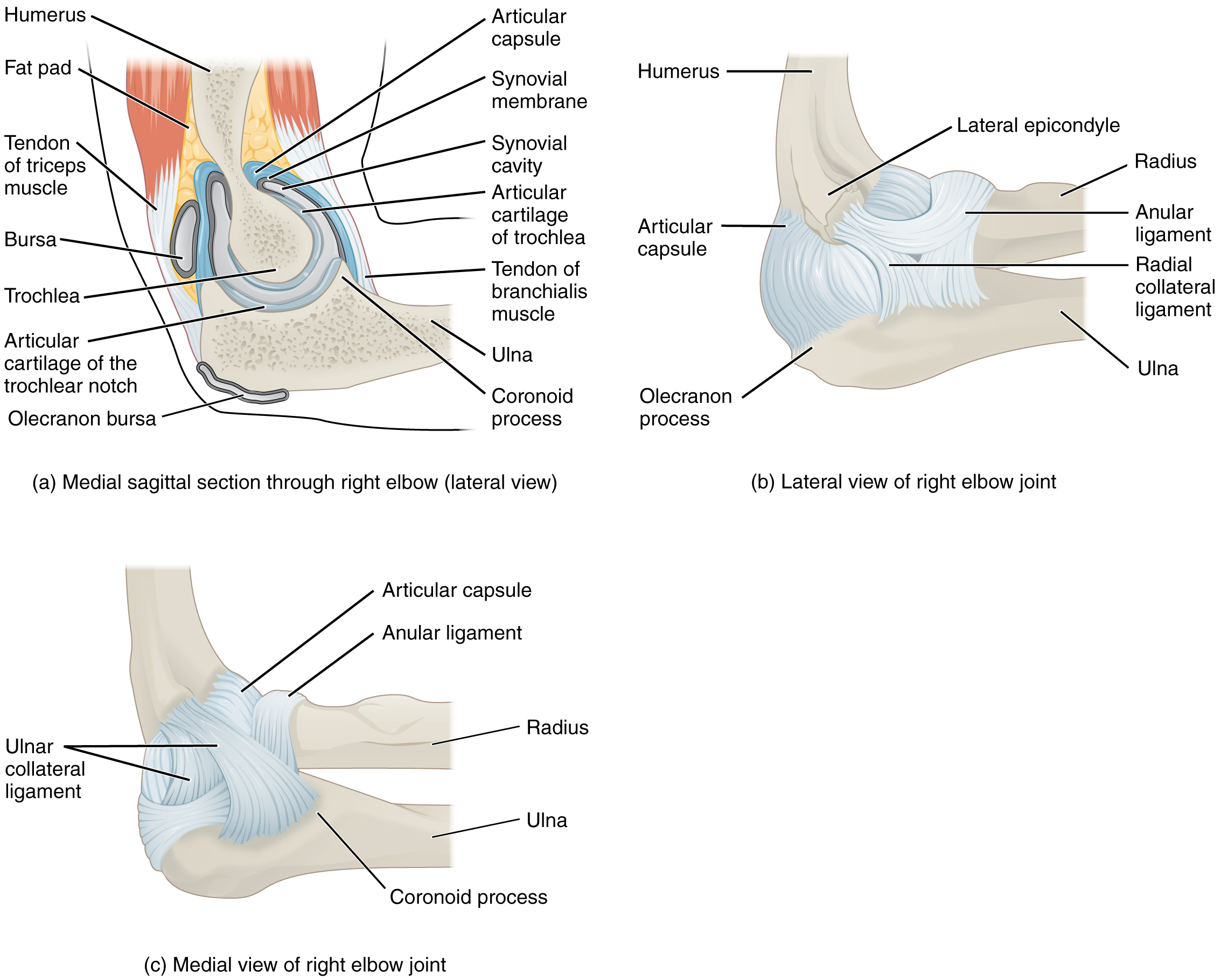
Anatomy
Upper Limb
A 23 year old woman presents to the ED after falling and sustaining a dislocation of the right elbow. Regarding the ligaments of the elbow, which of the following statements is CORRECT:
Answer:
The radial collateral ligament arises from the lateral epicondyle of the humerus and blends distally with the annular ligament of the radius. The ulnar collateral ligament arises from the medial epicondyle and distally attaches to the olecranon and coronoid process of the ulna. The annular ligament is a strong band of fibres that encircles the head of the radius, and retains it in contact with the radial notch of the ulna. The annular ligament is attached by both its ends to the anterior and posterior margins of the radial notch of the ulna.Elbow Joint
Anatomy / Upper Limb / Posterior Arm
Last Updated: 18th October 2019
Table: Anatomical Overview of the Elbow Joint
| Joint | Elbow |
|---|---|
| Type | Synovial hinge joint |
| Articulations | Trochlea of humerus with trochlear notch of ulna and capitulum of humerus with head of radius |
| Stabilising factors | Joint capsule, radial and ulnar collateral ligaments |
| Movements | Flexion and Extension |
Joint Articulations
The elbow is a synovial hinge joint. It is formed by the articulations between the trochlea of the humerus and the trochlear notch of the ulnar and between the capitulum of the humerus and the head of the radius.
Joint Movements
The movements of the elbow joint are extension and flexion.
Table: Movements of the Elbow Joint
| Movement | Main Muscles Involved | Main Nerves Involved |
|---|---|---|
| Flexion | Biceps brachii, brachialis, brachioradialis | Musculocutaneous nerve, radial nerve |
| Extension | Triceps brachii, anconeus | Radial nerve |
Joint Ligaments
The collateral ligaments of the elbow are medial and lateral thickenings of the joint capsule.
The radial collateral ligament arises from the lateral epicondyle of the humerus and blends distally with the annular ligament of the radius.
The ulnar collateral ligament arises from the medial epicondyle and distally attaches to the olecranon and coronoid process of the ulna.
The annular ligament is a strong band of fibres that encircles the head of the radius, and retains it in contact with the radial notch of the ulna. The annular ligament is attached by both its ends to the anterior and posterior margins of the radial notch of the ulna.

Elbow Joint. (Image by OpenStax College, CC BY 3.0 <https://creativecommons.org/licenses/by/3.0>, via Wikimedia Commons)
Report A Problem
Is there something wrong with this question? Let us know and we’ll fix it as soon as possible.
Loading Form...
- Biochemistry
- Blood Gases
- Haematology
| Biochemistry | Normal Value |
|---|---|
| Sodium | 135 – 145 mmol/l |
| Potassium | 3.0 – 4.5 mmol/l |
| Urea | 2.5 – 7.5 mmol/l |
| Glucose | 3.5 – 5.0 mmol/l |
| Creatinine | 35 – 135 μmol/l |
| Alanine Aminotransferase (ALT) | 5 – 35 U/l |
| Gamma-glutamyl Transferase (GGT) | < 65 U/l |
| Alkaline Phosphatase (ALP) | 30 – 135 U/l |
| Aspartate Aminotransferase (AST) | < 40 U/l |
| Total Protein | 60 – 80 g/l |
| Albumin | 35 – 50 g/l |
| Globulin | 2.4 – 3.5 g/dl |
| Amylase | < 70 U/l |
| Total Bilirubin | 3 – 17 μmol/l |
| Calcium | 2.1 – 2.5 mmol/l |
| Chloride | 95 – 105 mmol/l |
| Phosphate | 0.8 – 1.4 mmol/l |
| Haematology | Normal Value |
|---|---|
| Haemoglobin | 11.5 – 16.6 g/dl |
| White Blood Cells | 4.0 – 11.0 x 109/l |
| Platelets | 150 – 450 x 109/l |
| MCV | 80 – 96 fl |
| MCHC | 32 – 36 g/dl |
| Neutrophils | 2.0 – 7.5 x 109/l |
| Lymphocytes | 1.5 – 4.0 x 109/l |
| Monocytes | 0.3 – 1.0 x 109/l |
| Eosinophils | 0.1 – 0.5 x 109/l |
| Basophils | < 0.2 x 109/l |
| Reticulocytes | < 2% |
| Haematocrit | 0.35 – 0.49 |
| Red Cell Distribution Width | 11 – 15% |
| Blood Gases | Normal Value |
|---|---|
| pH | 7.35 – 7.45 |
| pO2 | 11 – 14 kPa |
| pCO2 | 4.5 – 6.0 kPa |
| Base Excess | -2 – +2 mmol/l |
| Bicarbonate | 24 – 30 mmol/l |
| Lactate | < 2 mmol/l |

